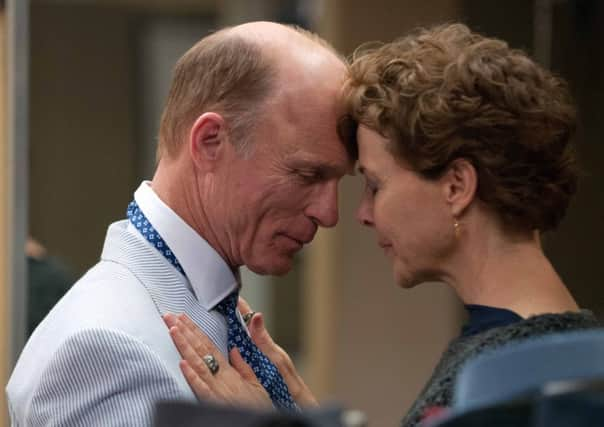Film review: The Face of Love | The Green Prince


The Face Of Love (12A)
Directed by: Arie Posin
Starring: Annette Bening, Ed Harris, Robin Williams, Jess Weixler
Star rating: **
A late blooming romance with neo-gothic underpinnings, the film begins with Bening and Harris as Nikki and Garret, a long-term married couple still very much in love. Sickening displays of happiness in a film’s first five minutes rarely bode well for the characters involved, and so it proves as a romantic trip to Mexico ends in tragedy when Nikki comes across her husband’s body lying in the surf, dead after an apparent drowning.
Advertisement
Hide AdOf all the places the film could go after this set-up, co-writer and director Arie Posin opts for the silliest as the plot jumps ahead five years to find the placidly widowed Nikki falling for a dead-ringer for her late husband. This is Tom (also Harris), a painter and art tutor with whom Nikki becomes increasingly obsessed, insinuating herself into his life and eventually falling for him just as he unsuspectingly falls for her. The film foreshadows the doppelganger theme with references to Hitchock’s Vertigo, but there’s no attempt to explain the mystery of why Tom would look identical to Garret, and there’s no psychological depth in the characters either – or at least none that really emerges from the way the story has been executed. Instead, Posin maps everything out with clunky plot devices, groaning symbolism and dreary dialogue.
This has the most detrimental effect on Bening’s peformance. Stuck in a film uninterested in nuance, she comes across as deranged and unlikeable, particularly as she tries to prevent her grown-up daughter (Jess Weixler) from meeting Tom. Harris barely fares any better. Playing an artist once again, he gets to riff on Pollock, but the film is neither abstract nor expressionistic enough to convey anything profound about the mysteries of life that have brought these characters together. The only relief from torpid melodrama comes from the natural gravitas each star brings – and from the few grace notes Robin Williams supplies as a sad-sack neighbour who is starting to resent the fact that his efforts to woo Nikki over the years appear to have been wasted. Sadly, this all feels like a wasted effort.
The Green Prince (15)
Directed by: Nadav Schirman
Star rating: ***
This documentary about spycraft in the Israeli-Palestinian conflict has the sort of dramatic set-up fiction filmmakers dream about. After being caught running guns, a young Palestinian radical by the name of Mosab Yousef is coerced by Israel’s internal security service Shin Bet into spying on Hamas. The twist? His father happens to be Sheikh Hassan Yousef, a co-founder of Hamas and one of its firebrand leaders. Telling his own story in a series of direct-to-camera interviews, Mosab recounts with gripping urgency his rapid disillusionment with his father’s cause and the physical abuse he suffered at the hands of Hamas after being thrown into the Palestinian wing of an Israeli prison. But his conflicted feelings about his subsequent role as Israel’s most important informant (his codename supplies the film with its title) comes through too, when his impassioned narrative is cross-cut with a more pragmatic account of his involvement supplied by his Israeli handler, Gonen Ben Yitzhak. Though no film really has a hope of untangling the complexities of the conflict, this succeeds in putting a human face on them.
Tinker Bell and the Legend of the Neverbeast (U)
Directed by: Steve Loter
Voices: Mae Whitman, Ginnifer Goodwin, Rosario Dawson
Star rating: **
This is the second Tinker Bell film to be released by Disney this year and the churn-em-out approach is obviously taking its toll on the eponymous fairy: she functions more as a brand name than a main player this time. The plot hokum revolves around Tink’s fairy friend Fawn (Ginnifer Goodwin), who befriends the titular NeverBeast little realizing that he’s part of a prophecy that could spell the end for Pixie Hollow. Of course the NeverBeast turns out to be less hell-bent on destruction than its fearsome features suggest, which allows the film to pay lip-service to the value of tolerance and diversity despite Tinker Bell and her friends looking like they’ve flown off the production line of a Barbie factory.
The Snow Queen: Magic of the Ice Mirror (U)
Directed by: Aleksey Tsitsilin
Voices: Sean Bean, Sharlto Copley, Bella Thorne
Star rating: *
If the new Tinker Bell film seems like a weak family fare, it’s a masterpiece compared to this cheap-looking Russian animation effort from producer Timur Bekmambetov, the genre hack best known for directing hyper-violent action films like Wanted and Night Watch. For those who missed the first film, there’s a quick précis of its gibberish action to reintroduce us to its troll hero Orm (voiced by Sharlto Copley), but the subsequent story – which also features the vocal talents of Sean Bean – is charmless and boring, bares little relationship to Hans Christian Andersen’s fairy tale, and should in no way be mistaken for a way to satiate fans of Frozen.
Me, Myself and Mum (15)
Directed by: Guillaume Gallienne
Starring: Guillaume Gallienne, André Marcon, Clémence Thioly
Star rating: ***
Advertisement
Hide AdFrench comedian Guillaume Gallienne serves as writer, director and star of this adaptation of his one-man theatre show charting his struggle to come out of the closet as a heterosexual man after being raised by a domineering mother to believe he was gay. The twist on the coming-of-age story makes this stylized comedy intriguing up to a point, but Gallienne’s decision to retain the theatrical and confessional nature of the show – playing both his teenage self and his mum, and incorporating frequent stage-bound interludes – starts to grate after a while.